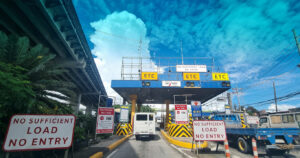By Ashley Erika O. Jose, Reporter
MOTORISTS passing through expressways without electronic toll collection (ETC) devices or radio frequency identification (RFID) tags would be fined starting March, the Toll Regulatory Board (TRB) said.
The new tollway guidelines, which were supposed to be enforced last year, are tentatively scheduled to be implemented by March 1, TRB Executive Director Alvin A. Carullo told BusinessWorld on Tuesday.
Mr. Carullo said the government is only targeting to fine motorists without RFID tags first. Fines on motorists with insufficient wallet balance will not yet be implemented, he added.
“Fines for no valid ETC device will be implemented, but fines for (motorists with) no sufficient load balance will not yet be implemented,” Mr. Carullo said in a Viber message.
The tollway guidelines under Joint Memorandum Circular (JMC) No. 2024-001 were supposed to be enforced starting Oct. 1 last year.
However, the Department of Transportation (DoTr) deferred the implementation to 2025 to give tollway operators and concerned agencies time to fine-tune their operations.
All motorists entering an access highway without an ETC device will face a fine of P1,000 for the first offense, P2,000 for the second offense and P5,000 for subsequent offenses, according to the memo issued last year.
The circular also stated that motorists exiting toll expressways with insufficient account balance will be fined P500 for the first offense, P1,000 for the second offense and P2,500 for subsequent offenses.
Rene S. Santiago, former president of the Transportation Science Society of the Philippine, said imposing penalties for motorists without RFID tags is a bad policy due to defective RFID readers and delayed gates at expressways.
“It would be fair if TRB also penalizes tollway operators for malfunctioning systems and deficient interoperability,” Mr. Santiago said in a Viber message.
SMC Infrastructure, which operates San Miguel Corp.’s (SMC) toll road network, said the company is prepared to implement a cashless toll payment and that all of its toll roads are equipped to support its implementation.
The company also said the transition to cashless toll payment would also help ease traffic congestion.
“SMC Infrastructure has been ready for cashless toll payments since last year, with all our toll roads equipped to support it,” it said, noting that its teams are also on standby to install RFID tags for motorists who do not have it yet.
BusinessWorld also sought comments from toll road operator Metro Pacific Tollways Corp. (MPTC) but had not received a response as of the deadline.
The implementation of a cashless toll collection is needed for the planned electronic toll collection interoperability, the TRB said.
The TRB also plans to introduce a unified RFID wallet system that can be used in various tollways.
Mr. Carullo said previously the TRB and tollway operators were just ironing out the implementation of the planned interoperability.
He said they are doing some tests to fix some technical glitches to ensure its seamless implementation.
Easytrip is used on MPTC’s North Luzon Expressway, Subic–Clark–Tarlac Expressway, Manila-Cavite Expressway and Cavite-Laguna Expressway.
Meanwhile, Autosweep is used on the San Miguel group’s Skyway, South Luzon Expressway, NAIA Expressway, Southern Tagalog Arterial Road Tollway and Tarlac-Pangasinan-La Union Expressway.
MPTC is the tollway unit of Metro Pacific Investments Corp., one of three key Philippine units of Hong Kong-based First Pacific Co. Ltd., the others being Philex Mining Corp. and PLDT Inc.
Hastings Holdings, Inc., a unit of PLDT Beneficial Trust Fund subsidiary MediaQuest Holdings, Inc., has a majority stake in BusinessWorld through the Philippine Star Group, which it controls.

